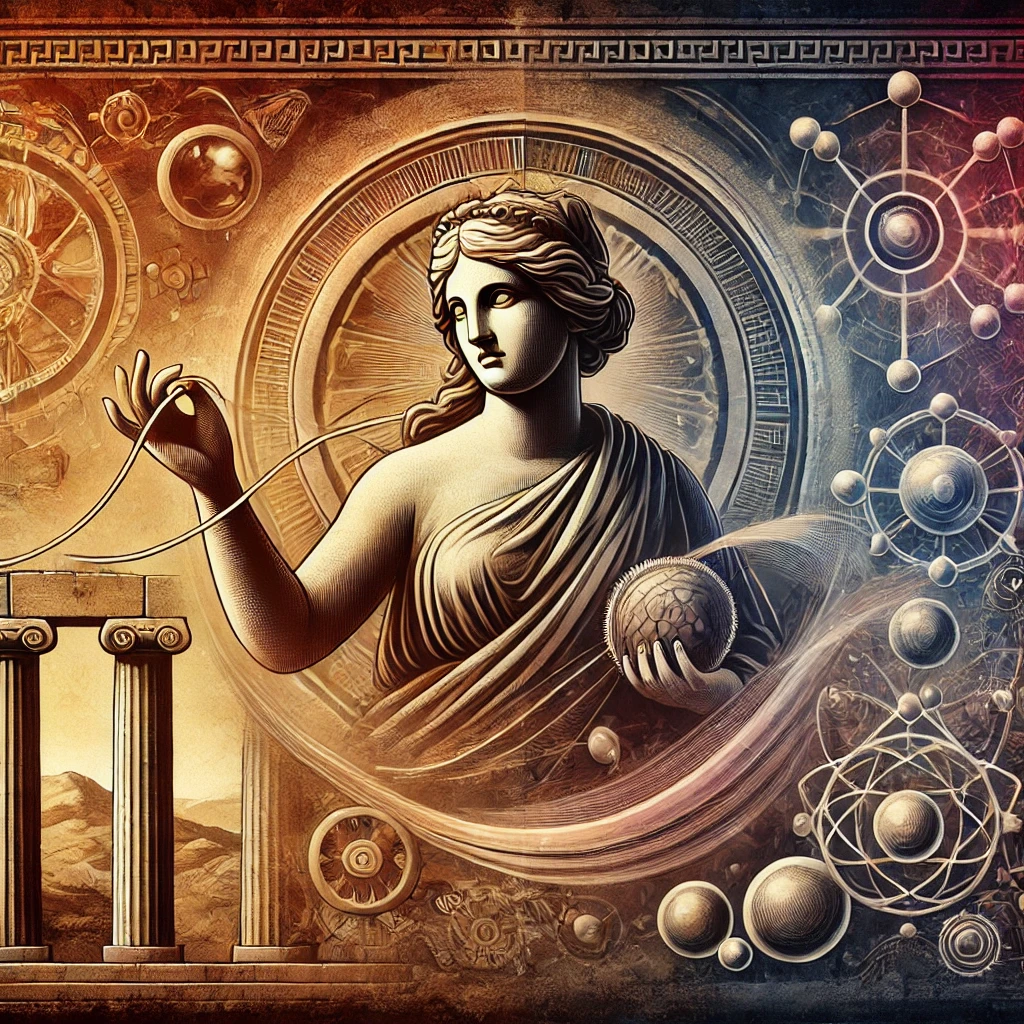Ancient Greek mythology symbolized the inevitability of fate or inevitability, and through the development of philosophical thought, it was transformed into various meanings such as lawfulness from a mechanistic perspective and the inevitability of qualitative conditions from an objective perspective.
‘Ananke’ appears in ancient Greek mythology as a goddess symbolizing inevitable fate or inevitability. At a time when the mythological imagination was the dominant way of looking at the world’s phenomena, Anke came to mean ‘inevitability as fate’. This role played an important role in helping the Greeks understand and accept the inevitable aspects of life. She was often depicted as symbolizing fate beyond human power, which served as a reminder to the Greeks of the laws of nature and human limitations.

However, with the rise of philosophical thought, Ancient Greece’s goddess became a theoretical concept. In this process, she came to mean many different things depending on how one views the world. In particular, ananke as a philosophical concept has quite different meanings depending on two different ways of looking at the world: mechanistic and teleological. This shift in philosophical thought reflects the intellectual development of Greek society, and the concept of an anchorite was expanded from a mere mythological entity to a more complex and profound philosophical issue.
The mechanistic view is the view that there is no ultimate purpose to the world, but only mechanical laws. According to this view, the world is a sophisticated machine, and only the mechanical concepts of mass, velocity, and so on are necessary to explain its phenomena. Therefore, there is no ultimate purpose for the world to be the way it is today, only the laws of cause and effect. In contrast, the purposivist view is that the world is predicated on some ultimate purpose and that the world is moving toward it. Therefore, the world is not perfect because it is in the process of moving toward an ideal purpose. The difference between these two views has become a central topic of philosophical discussion, and various philosophers have debated the issue.
In the mechanistic view, ananke means inevitability in the sense of lawfulness. Democritus’ theory exemplifies this mechanistic view of ananke. Democritus, who sees the action of reason as a kind of atomic motion, recognizes only the law of dynamic cause and effect, which states that certain collisions of atoms characterized by shape, position, and arrangement cause certain effects. This lawfulness is the anankei of the mechanistic view. This position of Democritus was later to have a major impact during the Scientific Revolution and became the foundation of many scientific theories, including Newton’s classical mechanics.
In contrast, from a teleological perspective, ananke means necessity in the sense of a qualitative condition. In this case, the ‘qualities’ are the conditions that must exist in order for the ideal end, the ‘Forms’, to be realized in reality. Plato, who holds an objectivist view, believes that the form before it is realized in reality is perfect in itself, and that there is an error or disorder in reality because the substance does not contain the form as it is. In other words, ananke in Plato’s view means inevitability as a qualitative condition that must exist for the form to be realized in reality. At the same time, there are limits to the material’s ability to fully embrace the form, so anēnē is something to be overcome. This idea of Plato’s is closely linked to his Idea and was highly influential on medieval philosophers.
Thus, an anchē is an important concept that originated in the mythological imagination of ancient Greece and took on a variety of meanings as philosophical thought developed. For the Greeks, she was no longer simply a goddess of fate, but developed into a philosophical problem that explored the limits of human existence and the possibility of overcoming them. This transformation shows us how deeply influential she was as a philosophical symbol that went beyond mere mythology. The concept of Ankh remains one of the most important topics of discussion in modern philosophy, and it continues to be reinterpreted as part of the ongoing human endeavor to understand the world.
 I’m a blog writer. I want to write articles that touch people’s hearts. I love Coca-Cola, coffee, reading and traveling. I hope you find happiness through my writing.
I’m a blog writer. I want to write articles that touch people’s hearts. I love Coca-Cola, coffee, reading and traveling. I hope you find happiness through my writing.